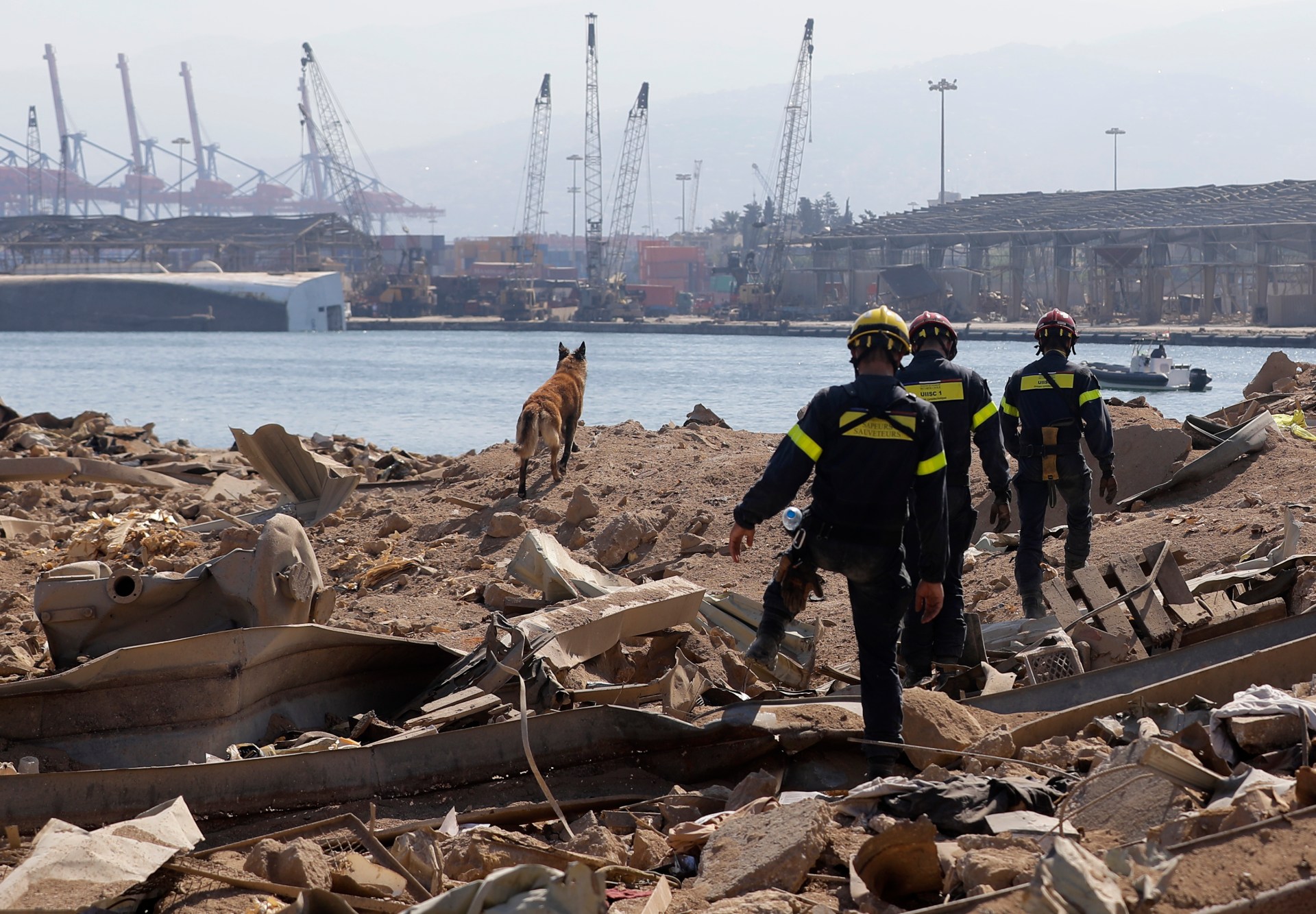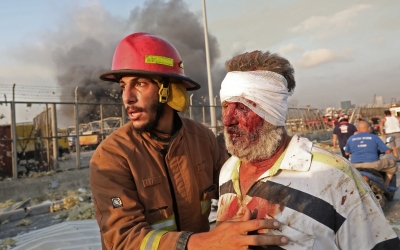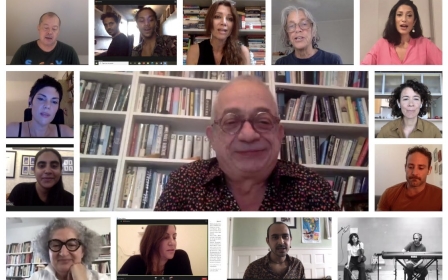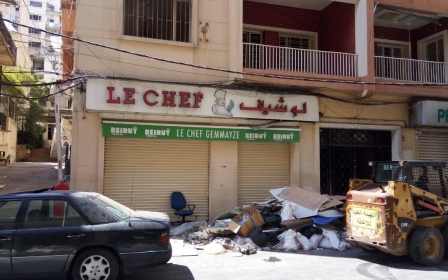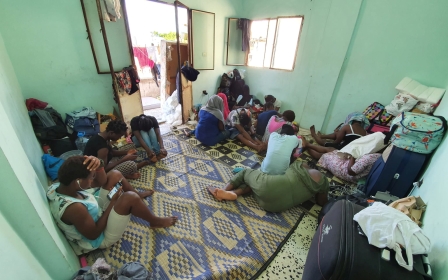Beirut explosion: Hope and despair as family search for missing port worker
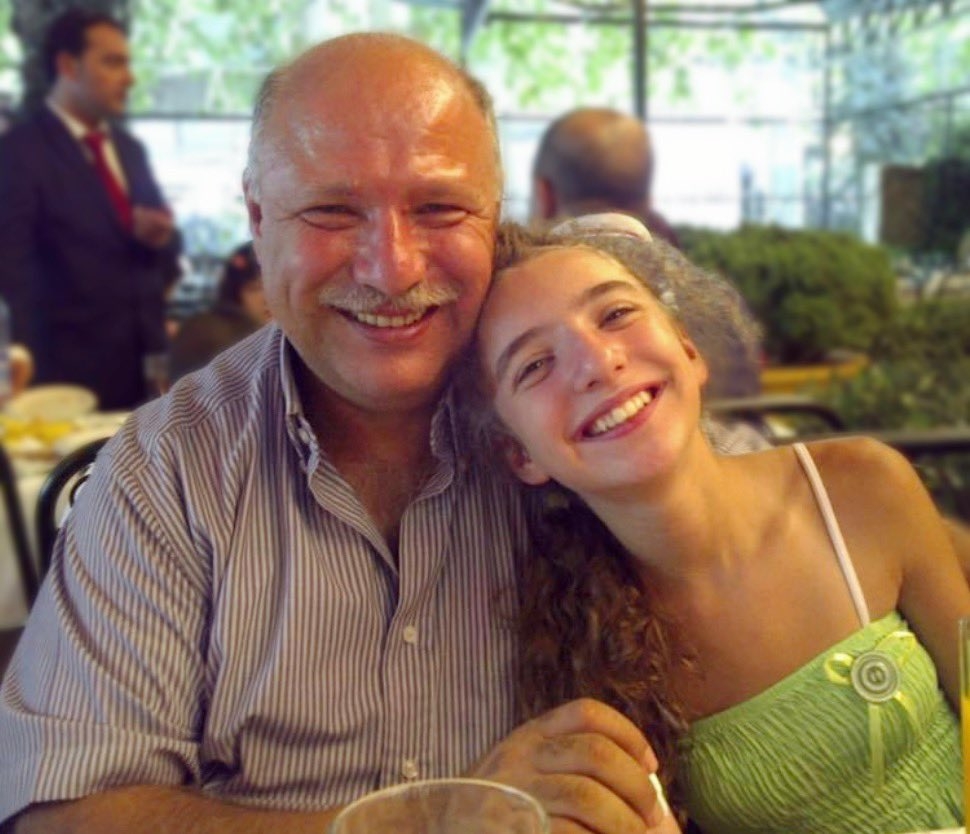
Ten days on from the horrifying explosion that shook Beirut to its foundations, much of the rubble and glass strewn across the Lebanese capitals’ streets has been cleared.
But the search for those missing continues.
At least 172 people have been confirmed dead in the 4 August blast at Beirut port. Not all of the bodies have been identified, however, and many residents of the Lebanese capital are yet to be found.
Ghassan Hasrouti, who worked at the port’s grain silos right next to Hanger 12 where 2,700 tonnes of ammonium nitrate mysteriously ignited, is among the missing.
His 35-year-old son Elie knew something was wrong from the moment he felt the blast from Beirut’s suburbs.
New MEE newsletter: Jerusalem Dispatch
Sign up to get the latest insights and analysis on Israel-Palestine, alongside Turkey Unpacked and other MEE newsletters
“The sound was so loud I thought the explosion happened right here in the mountains,” Elie Hasrouti recalled.
“My first instinct was that my father was in trouble.”
Ghassan’s family immediately cried for help. A tweet by his daughter Tatiana went viral, asking people for whatever information they might have.
In the hours and days following the explosion, the Hasrouti family ran through a maze of hospitals, rescue groups and aid organisations, but to no avail.
With several hospitals impacted by the blast and put out of commission, Beirut’s already strained medical facilities were treating the wounded on floors, parking lots, and any corner of space they could find.
Like his sister Tatiana and his aunt Emilie, Elie has been extremely vocal on social media.
Less than two days after the explosion, he made his way to the port, recording a video explaining where he believes Ghassan and his six colleagues might be, urging for a full search and rescue operation.
Three days after the explosion, on 7 August, Elie told Middle East Eye that his family, like other families of the missing, continues to be neglected.
“No side is communicating with us,” Elie said, trying to hold back his anger.
“We’re talking with everyone and we’re sharing information we have with the media and the people impacted.”
But despite speaking to numerous regional and international television stations and media outlets, it appeared that searches at the blast site were not an immediate priority for authorities.
A source from the Lebanese Red Cross told MEE that the Lebanese army had seized control of the blast site and subsequently the search and rescue operation, while investigations into the cause of the fire that ignited the ammonium nitrate continue.
As a consequence, the Red Cross and civil defence’s search and rescue efforts have been curtailed.
Meanwhile, international rescue teams from France, Russia, Poland, Germany, Italy, Qatar, among other countries, have made their way into the blast site.
Of the original 60 or so people recorded missing in Beirut, several have been found - though most were lifeless.
Waves of support
Elie still continues tirelessly to find his father. But as the search drags on and state support is yet to appear, the work is wearing him down.
After 10 days relatives of those missing have little or no hope that they will be discovered alive.
But when body parts or a corpse are uncovered in the port, Elie rushes to the scene hoping to better know his father’s fate and be able to put him to rest.
“Last night, a body was found under the rubble,” Elie said.
“We rushed to find out how the DNA test procedures worked and who to follow up with, but we are still left to wait.”
'The sound was so loud I thought the explosion happened right here in the mountains. My first instinct was that my father was in trouble'
- Elie Hasrouti
He added that a local rights organisation reached out to help him with “legal matters”, but he has received no word from international organisations nor the authorities.
“I think I’m still in the denial phase, after the shock,” Elie reflected. “And I think this keeps me going to share my story about what is going on, and trying to find light in the darkness I’m going through now.”
Tatiana’s tweet in the moments after her father’s disappearance has attracted waves of support for the struggling family, which has given them much-needed morale boosts.
“I didn’t know who to answer on the phone. People kept calling to check up, and the media showered their care too,” Elie said.
Glimmers of hope
But that hasn’t suppressed their anger and resentment for the Lebanese authorities.
“This became the cause that revealed the rulers’ terrorism that caused the explosion … and now it’s showing their failure in responding to these crises,” Elie said.
As with most aspects of administration and society in the country, Lebanese authorities have a poor track record when it comes to recovering those lost in disasters and conflicts.
Some 17,000 from Lebanon’s 1975-90 civil war remain missing to this day, and the government only passed a law to investigate the matter last year.
Elie, an engineer who is currently pursuing a PhD in international relations, felt some hope that Lebanon’s corrupt and sectarian political system could be dismantled when popular protests broke out in October.
“What I saw revealed is that a large chunk of the population are now aware, and this is the first step to change this reality,” he said. “Everything the uprising went through, with all the ideas that came through, it has to be able to unite the Lebanese.”
He’s adamant that the uprising needs to come back in full form, saying that the dire economy and “hunger will force people to revolt, just like in Egypt [in 2011] or anywhere else in the world”.
Despite Lebanon’s gloomy situation, there have been some glimmers of hope in the wake of the blast; you could even call them miracles.
Amin al-Zahed, a young Beirut port worker, was found floating in the Mediterranean Sea 30 hours after the explosion. He was somehow alive, though badly wounded.
Away from the port, brave nurses at the St Georges Hospital made it out of the rubble to save the babies at the neonatal intensive care unit.
For Elie, his ability as a musician helps him keep faith and carry on.
“I didn’t have time to listen to music, but as a musician, my ability to pay attention to detail, stay alert, and interact with my surroundings constructively helped,” he said with a quiet laugh.
“And it also helped my ability to feel strength, love, and life that I always try to find around me.”
Middle East Eye delivers independent and unrivalled coverage and analysis of the Middle East, North Africa and beyond. To learn more about republishing this content and the associated fees, please fill out this form. More about MEE can be found here.


